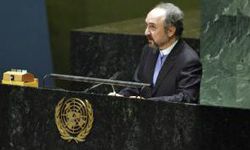Envoy Renews Iran’s Support for Syrian Gov’t, Nation

Iran’s Permanent Representative to the United Nations Mohammad Khazayee once again underlined Iran’s continued support for the Syrian government and nation in their fight against foreign-backed terrorists.
The Iranian envoy made the remarks at the UN General Assembly on Wednesday.
“The presence of foreign-backed armed rebels in Syria endangers the stability and security of the whole region,” Khazayee said.
He noted that Iran supports a peaceful solution to the Syrian crisis through national dialogue.
In similar remarks last week, Iranian Foreign Minister Ali Akbar Salehi said the Islamic Republic supports Syria’s integrity, unity and sovereignty, adding that the Syrian government and opposition should hold talks in a bid to reach a political solution to the crisis in the Muslim country.
Salehi noted that Tehran is against any foreign interference in Syria’s domestic affairs, stressing that Syrians should determine their own destiny.
Earlier this month, Salehi said his recent tour of the regional states was aimed at preventing the spread of the Syrian crisis into the region, and added that the regional countries share Tehran’s views on Syria.
“The Islamic Republic of Iran is in constant contact with different regional states to prevent the harmful aftermaths of some regional developments from spreading to the entire region,” Salehi said on the sidelines of a conference dubbed as ‘Diplomacy and Soft Power in the Great Prophet’s (PBUH) Sirah (life and tradition)’ in Tehran.
Salehi also said that during his trip to Damascus he had a meeting with Syrian President Bashar al-Assad to share the world and regional countries’ views on the Syrian crisis with Assad, and said “good decisions were made” at the meeting.
Salehi ended his two-day tour of Jordan and Syria on Wednesday. The Iranian foreign minister, heading a high-ranking delegation, started a visit to Jordan and Syria last week to discuss bilateral ties and regional developments, the Syrian crisis in particular.
Syria has been experiencing unrest since March 2011 with organized attacks by well-armed gangs against Syrian police forces and border guards being reported across the country.
The US and its western and regional allies have long sought to topple Syrian President Bashar al-Assad and his ruling system. Media reports said that the Syrian rebels and terrorist groups have received significantly more and better weapons in recent weeks, a crime paid for by the Persian Gulf Arab states and coordinated by the United States.
The US daily, Washington Post, reported in May that the Syrian rebels and terrorist groups battling Assad’s government have received significantly more and better weapons in recent weeks, a crime paid for by the Persian Gulf Arab states and coordinated by the United States.
The newspaper, quoting opposition activists and US and foreign officials, reported that Obama administration officials emphasized the administration has expanded contacts with opposition military forces to provide the Persian Gulf nations with assessments of rebel credibility and command-and-control infrastructure.
Opposition activists who several months ago said the rebels were running out of ammunition said in May that the flow of weapons – most bought on the black market in neighboring countries or from elements of the Syrian military in the past – has significantly increased after a decision by Saudi Arabia, Qatar and other Persian Gulf states to provide millions of dollars in funding each month.







